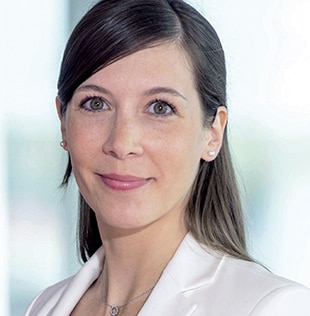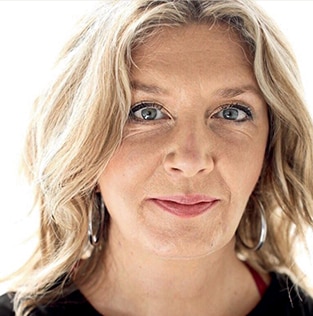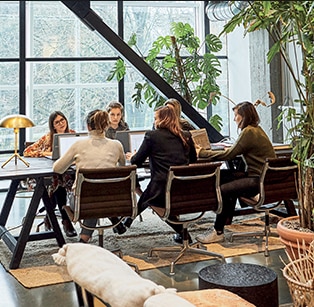Header
Expert Panel for Nespresso Professional
ANOTHER WAY TO WORK:
EXPERT PANEL
NEW WORKSPACES, NEW DIGITAL TOOLS, NEW ORGANISATIONS... THE WAY WE WORK IS EVOLVING AT A GREATER PACE THAN EVER BEFORE. WHAT IMPACT WILL THESE CHANGES HAVE ON SUSTAINABILITY, WELL-BEING, AND CREATIVITY? WHAT ELSE? BROUGHT THREE EXPERTS TOGETHER TO EXAMINE THE CHALLENGES OF THIS REVOLUTION IN THE WORLD OF WORK
By Peyo Lissarrague Photos Laetizia Bazzoni
Femke Aerts
“My working day always starts with a coffee. It’s a fixed feature in my routine. And whenever discussing business, offering a cup of coffee naturally changes the experience for the other person. Especially when it’s a quality brand!”
Femke Aerts is a Senior HR Manager People & Organisation at PricewaterhouseCoopers, the international professional services firm. She specialises in human resources, strategy, and the future of work.
> pwc.be

The expression “new ways of working” neatly encompasses a number of disruptive evolutions. Some are directly linked to digitalisation – the COVID-19 pandemic saw a surge in working from home and video-conferences – but others stem from how companies are organised and managed, and the use of space. Femke Aerts, Senior HR Manager at the professional services firm Pricewaterhouse Coopers (PwC), reports that, “It’s primarily a matter of agility and flexibility. Businesses are being faced with unprecedented challenges. To adapt, they need to consider both the experience of their workers, as well as how their future needs will evolve. Nobody can today imagine how our working environments will evolve in the medium-term. And it is through this optic that PwC has partnered with Vitra to completely rethink the space inside our Experience Center in Zurich, for modular working”. Tineke Foblets, a project manager at Vitra, adds that, “Not quite open space, nor completely partitioned, the primary quality of 2020’s workspace is the ability to transform, adjusting to the nature of each task and according to the changing needs of the organisation. The extent of stability or transformation can even vary between departments in the same company. Lockdown has changed the way we see homeworking, which is an increasingly common alternative, but the virtues of face-to-face interaction should not be forgotten, especially in an environment where people can focus and work alone or with the team as required. Whether in a coworking space or a company’s offices, when employees feel comfortable, they develop a sense of belonging that boosts their personal investment and their performance”.
Tineke Foblets
“I always like to have a coffee with my clients, it’s the perfect ice breaker to start a conversation. It embodies that fundamental social connection that we still need today, and that no remote working technology can really replace.”
Tineke Foblets is an interior designer. She has been a Project Manager at Vitra, a Swiss furniture design company, for more than 20 years.
> vitra.com


Marie Delvaulx
“Coffee brings people together.
It’s a way to open the dialogue in a meeting,
for example, but also with your colleagues.
There’s a reason we meet by the coffee machine...”
Marie Delvaulx is the director of The Shift, a charity that provides a sustainable development platform where more than 440 businesses, NGOs, and organisations can get together to forge partnerships and help create sustainable operations models.
> theshift.be
Flexibility and innovation
As a specialist in leadership and the future of work, Femke Aerts explains that, “Enhancements to well-being and an increased number of development opportunities for staff are two of the main corollaries of these changes. By facilitating flexible working and giving employees more independence, these new ways of working encourage greater responsibility and individual initiative”. For Marie Delvaulx, director of The Shift, a sustainable development platform, “They also break down traditional hierarchies and impose new forms of leadership. From this point of view, it is credible to suggest that by promoting emulation and more varied contacts, the evolution of the workplace may also rebalance particular dynamics, especially within large companies, and be a vector for equality. But there is no one-size-fits-all solution. Whether it’s in terms of the environment or companies themselves, new avenues must be explored, taking the company culture into account in a series of often complex factors, particularly in terms of sustainability”.
Awareness is essential
And there it is: “sustainability”. Indeed, sustainability plays a key role in the new ways of working. Both organisations and employees are increasingly sensitive to the issue. “We are seeing it in the kinds of office furniture people go for today”, confirms Tineke Foblets, who is also an interior designer. “Recyclable or recycled components are everywhere. People want to give products a second life. At Vitra, we created the Vitra Circle, which provides refurbished stock or display models of furniture.” Leading a charity that unites 440 businesses and NGOs, Marie Delvaulx agrees wholeheartedly: “Sustainability, in its broadest sense, must be seen as a key component in any organisation, and incorporating the circular economy into office furnishings is an example of this. And when the circular economy becomes essential to business, we see, for example, the emergence of furniture hiring services that avoid needless purchases for a lower environmental impact. We should also mention how mobility relates to new ways of working. Being accessible by public transport to reduce CO2 emissions, and the expansion of remote working are major trends that organisations are taking on board. It is a paradigm shift that is already bearing its fruits”.

